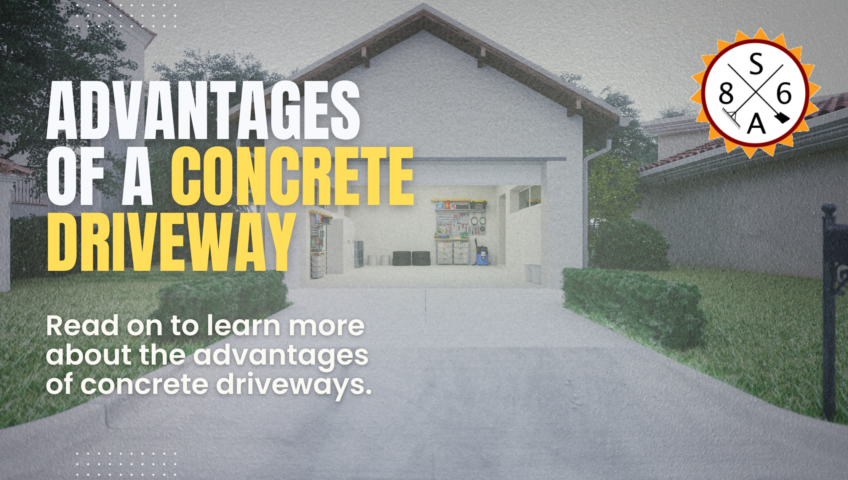
7 BENEFITS OF INSTALLING CONCRETE DRIVEWAYS
Many homeowners and business owners ask, “which driveway material is best”. The choices include brick, asphalt, pavers, gravel, or a concrete driveway. But, when you ask any driveway contractor, they will tell you that a concrete driveway is the best material, by far.
Pavers, gravel, and brick have the problem of sinking into the soil, causing an uneven and bumpy driveway. You can also weed growth in the joints along with trip and fall hazards. Asphalt driveways have a much shorter life span when compared to a concrete driveway. The problems with asphalt driveways include crumbling, dips and upheavals, along with a lot of cracking on the surface and edges.
A professional concrete contractor is expert at choosing the right concrete mix, will determine the appropriate driveway thickness, and install rebar if necessary to provide additional structural and weight capacity for your driveway.
7 Concrete Driveway Benefits
1. Long-lasting driveway surface
A concrete driveway installed by a concrete contractor can last 25 to 30 years. With little maintenance and in moderate climates, you can expect your concrete driveway to outlast all other materials that are available.
2. Easier to maintain
Concrete driveways are low maintenance surfaces. If the driveway is exposed to harsh weather or heavy traffic, then re-sealing the concrete surface more often to maintain its pristine condition.
3. Holds up better to heat and light
Asphalt driveways react badly to both heat and light. Yet, concrete is almost impervious to UV radiation or high summer temperatures. A concrete driveway is the preferred material for warmer climates because it can withstand exposure to direct sunlight and heat without deterioration.
4. Better load-bearing capacity
If you park multiple cars or heavy vehicles like SUVs or pickup trucks in your driveway, then concrete is the best material to bear up under heavy weight. This is because concrete is a non-flexible material that will not dip or buckle due to weight concerns.
5. Environmentally-friendly material
Concrete is made of cement, sand, and gravel, while asphalt is a mixture of high-VOC (volatile organic compound), petroleum-based materials that will constantly release harmful fumes into the atmosphere and the soil. Concrete is considered a sustainable building material because almost 100% of it can be recycled.
6. Sell your property faster
A concrete driveway can increase the value of your home by up to 10% when you decide to sell. Also, home buyers look for a driveway that has been installed by a concrete contractorbecause they know it will last longer, with little or no maintenance.
7. Easier to remove ice and snow
Because concrete driveways will not dip or bulge when installed and maintained properly, it will be easier to shovel or run a snow blower across. Also, there are good ice melt options available that will not corrode or deteriorate your concrete driveway surface.
If you want a driveway that features a bright, professional appearance without messy surface issues, then concrete is the better choice when compared to asphalt, brick, pavers, gravel, or other materials. Also, today’s concrete contractor can create a unique, custom driveway for your home.
Stamped concrete, border details, and a wider variety of concrete stains can add personality and pizzazz to your home.
To learn more about how a modern concrete driveway can increase the value of your home and reduce your outdoor maintenance, talk with a concrete contractor, today!
Many homeowners and business owners ask, “which driveway material is best”. The choices include brick, asphalt, pavers, gravel, or a concrete driveway. But, when you ask any driveway contractor, they will tell you that a concrete driveway is the best material, by far.
Pavers, gravel, and brick have the problem of sinking into the soil, causing an uneven and bumpy driveway. You can also weed growth in the joints along with trip and fall hazards. Asphalt driveways have a much shorter life span when compared to a concrete driveway. The problems with asphalt driveways include crumbling, dips and upheavals, along with a lot of cracking on the surface and edges.
A professional concrete contractor is expert at choosing the right concrete mix, will determine the appropriate driveway thickness, and install rebar if necessary to provide additional structural and weight capacity for your driveway.
7 Concrete Driveway Benefits
1. Long-lasting driveway surface
A concrete driveway installed by a concrete contractor can last 25 to 30 years. With little maintenance and in moderate climates, you can expect your concrete driveway to outlast all other materials that are available.
2. Easier to maintain
Concrete driveways are low maintenance surfaces. If the driveway is exposed to harsh weather or heavy traffic, then re-sealing the concrete surface more often to maintain its pristine condition.
3. Holds up better to heat and light
Asphalt driveways react badly to both heat and light. Yet, concrete is almost impervious to UV radiation or high summer temperatures. A concrete driveway is the preferred material for warmer climates because it can withstand exposure to direct sunlight and heat without deterioration.
4. Better load-bearing capacity
If you park multiple cars or heavy vehicles like SUVs or pickup trucks in your driveway, then concrete is the best material to bear up under heavy weight. This is because concrete is a non-flexible material that will not dip or buckle due to weight concerns.
5. Environmentally-friendly material
Concrete is made of cement, sand, and gravel, while asphalt is a mixture of high-VOC (volatile organic compound), petroleum-based materials that will constantly release harmful fumes into the atmosphere and the soil. Concrete is considered a sustainable building material because almost 100% of it can be recycled.
6. Sell your property faster
A concrete driveway can increase the value of your home by up to 10% when you decide to sell. Also, home buyers look for a driveway that has been installed by a concrete contractorbecause they know it will last longer, with little or no maintenance.
7. Easier to remove ice and snow
Because concrete driveways will not dip or bulge when installed and maintained properly, it will be easier to shovel or run a snow blower across. Also, there are good ice melt options available that will not corrode or deteriorate your concrete driveway surface.
If you want a driveway that features a bright, professional appearance without messy surface issues, then concrete is the better choice when compared to asphalt, brick, pavers, gravel, or other materials. Also, today’s concrete contractor can create a unique, custom driveway for your home.
Stamped concrete, border details, and a wider variety of concrete stains can add personality and pizzazz to your home.
To learn more about how a modern concrete driveway can increase the value of your home and reduce your outdoor maintenance, talk with a concrete contractor, today!


